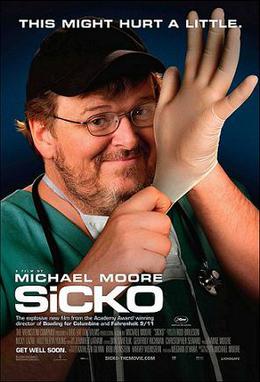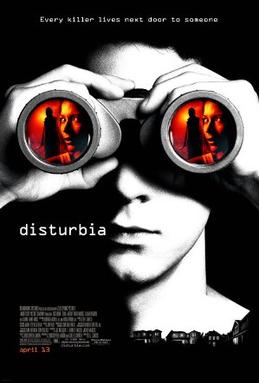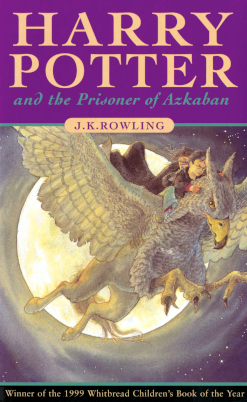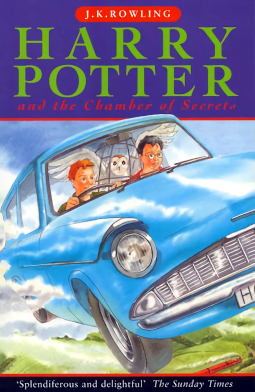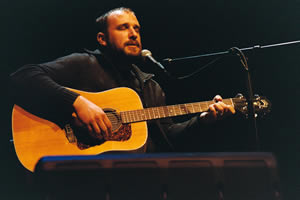Power can be such a tease. You're always wanting more. It's good to know that just like sex it can be paid for. - Pedro the Lion
The latest issue of Rolling Stone features a lengthy article by Robert F. Kennedy Jr., asking the question, "Was the 2004 election stolen?" I'm sure you know that. After all, since the issue hit the newsstands nearly two weeks ago the news has talked about nothing else. It's been on the front page of nearly every newspaper in the country. You can't spend more than a couple of minutes watching a cable news station in the States without hearing seeing hard-nosed investigative reporters following up on leads related to the story. It's just one more example of how the liberal media will pounce on anything to discredit the Bush administration.
Oh wait. Sorry. That didn't happen, except for the bit about the article in Rolling Stone. Kennedy's piece is quite thorough, and required reading, assuming you actually care about things like justice and fair play. Then again, if you're white, your vote stands a much better chance of being counted, so maybe you should just count your blessings.
Anyways, some excerpts:
Like many Americans, I spent the evening of the 2004 election watching the returns on television and wondering how the exit polls, which predicted an overwhelming victory for John Kerry, had gotten it so wrong. By midnight, the official tallies showed a decisive lead for George Bush -- and the next day, lacking enough legal evidence to contest the results, Kerry conceded. Republicans derided anyone who expressed doubts about Bush's victory as nut cases in ''tinfoil hats,'' while the national media, with few exceptions, did little to question the validity of the election. The Washington Post immediately dismissed allegations of fraud as ''conspiracy theories,'' and The New York Times declared that ''there is no evidence of vote theft or errors on a large scale.''
But despite the media blackout, indications continued to emerge that something deeply troubling had taken place in 2004. Nearly half of the 6 million American voters living abroad never received their ballots -- or received them too late to vote -- after the Pentagon unaccountably shut down a state-of-the-art Web site used to file overseas registrations. A consulting firm called Sproul & Associates, which was hired by the Republican National Committee to register voters in six battleground states, was discovered shredding Democratic registrations. In New Mexico, which was decided by 5,988 votes, malfunctioning machines mysteriously failed to properly register a presidential vote on more than 20,000 ballots. Nationwide, according to the federal commission charged with implementing election reforms, as many as 1 million ballots were spoiled by faulty voting equipment -- roughly one for every 100 cast.
The reports were especially disturbing in Ohio, the critical battleground state that clinched Bush's victory in the electoral college. Officials there purged tens of thousands of eligible voters from the rolls, neglected to process registration cards generated by Democratic voter drives, shortchanged Democratic precincts when they allocated voting machines and illegally derailed a recount that could have given Kerry the presidency. A precinct in an evangelical church in Miami County recorded an impossibly high turnout of ninety-eight percent, while a polling place in inner-city Cleveland recorded an equally impossible turnout of only seven percent. In Warren County, GOP election officials even invented a nonexistent terrorist threat to bar the media from monitoring the official vote count.
---------------------------
But what is most anomalous about the irregularities in 2004 was their decidedly partisan bent: Almost without exception they hurt John Kerry and benefited George Bush. After carefully examining the evidence, I've become convinced that the president's party mounted a massive, coordinated campaign to subvert the will of the people in 2004. Across the country, Republican election officials and party stalwarts employed a wide range of illegal and unethical tactics to fix the election. A review of the available data reveals that in Ohio alone, at least 357,000 voters, the overwhelming majority of them Democratic, were prevented from casting ballots or did not have their votes counted in 2004 -- more than enough to shift the results of an election decided by 118,601 votes. In what may be the single most astounding fact from the election, one in every four Ohio citizens who registered to vote in 2004 showed up at the polls only to discover that they were not listed on the rolls, thanks to GOP efforts to stem the unprecedented flood of Democrats eager to cast ballots. And that doesn't even take into account the troubling evidence of outright fraud, which indicates that upwards of 80,000 votes for Kerry were counted instead for Bush. That alone is a swing of more than 160,000 votes -- enough to have put John Kerry in the White House.
---------------------------
Indeed, the extent of the GOP's effort to rig the vote shocked even the most experienced observers of American elections. ''Ohio was as dirty an election as America has ever seen,'' Lou Harris, the father of modern political polling, told me. ''You look at the turnout and votes in individual precincts, compared to the historic patterns in those counties, and you can tell where the discrepancies are. They stand out like a sore thumb.''
The first indication that something was gravely amiss on November 2nd, 2004, was the inexplicable discrepancies between exit polls and actual vote counts. Polls in thirty states weren't just off the mark -- they deviated to an extent that cannot be accounted for by their margin of error. In all but four states, the discrepancy favored President Bush.
Over the past decades, exit polling has evolved into an exact science. Indeed, among pollsters and statisticians, such surveys are thought to be the most reliable. Unlike pre-election polls, in which voters are asked to predict their own behavior at some point in the future, exit polls ask voters leaving the voting booth to report an action they just executed. The results are exquisitely accurate: Exit polls in Germany, for example, have never missed the mark by more than three-tenths of one percent. ''Exit polls are almost never wrong,'' Dick Morris, a political consultant who has worked for both Republicans and Democrats, noted after the 2004 vote. Such surveys are ''so reliable,'' he added, ''that they are used as guides to the relative honesty of elections in Third World countries.'' In 2003, vote tampering revealed by exit polling in the Republic of Georgia forced Eduard Shevardnadze to step down. And in November 2004, exit polling in the Ukraine -- paid for by the Bush administration -- exposed election fraud that denied Viktor Yushchenko the presidency.
But that same month, when exit polls revealed disturbing disparities in the U.S. election, the six media organizations that had commissioned the survey treated its very existence as an embarrassment. Instead of treating the discrepancies as a story meriting investigation, the networks scrubbed the offending results from their Web sites and substituted them with ''corrected'' numbers that had been weighted, retroactively, to match the official vote count. Rather than finding fault with the election results, the mainstream media preferred to dismiss the polls as flawed.
''The people who ran the exit polling, and all those of us who were their clients, recognized that it was deeply flawed,'' says Tom Brokaw, who served as anchor for NBC News during the 2004 election. ''They were really screwed up -- the old models just don't work anymore. I would not go on the air with them again.''
In fact, the exit poll created for the 2004 election was designed to be the most reliable voter survey in history. The six news organizations -- running the ideological gamut from CBS to Fox News -- retained Edison Media Research and Mitofsky International, whose principal, Warren Mitofsky, pioneered the exit poll for CBS in 1967 and is widely credited with assuring the credibility of Mexico's elections in 1994. For its nationwide poll, Edison/Mitofsky selected a random subsample of 12,219 voters -- approximately six times larger than those normally used in national polls -- driving the margin of error down to approximately plus or minus one percent.
On the evening of the vote, reporters at each of the major networks were briefed by pollsters at 7:54 p.m. Kerry, they were informed, had an insurmountable lead and would win by a rout: at least 309 electoral votes to Bush's 174, with fifty-five too close to call. In London, Prime Minister Tony Blair went to bed contemplating his relationship with President-elect Kerry.
As the last polling stations closed on the West Coast, exit polls showed Kerry ahead in ten of eleven battleground states -- including commanding leads in Ohio and Florida -- and winning by a million and a half votes nationally. The exit polls even showed Kerry breathing down Bush's neck in supposed GOP strongholds Virginia and North Carolina.(30) Against these numbers, the statistical likelihood of Bush winning was less than one in 450,000. ''Either the exit polls, by and large, are completely wrong,'' a Fox News analyst declared, ''or George Bush loses.''
But as the evening progressed, official tallies began to show implausible disparities -- as much as 9.5 percent -- with the exit polls. In ten of the eleven battleground states, the tallied margins departed from what the polls had predicted. In every case, the shift favored Bush. Based on exit polls, CNN had predicted Kerry defeating Bush in Ohio by a margin of 4.2 percentage points. Instead, election results showed Bush winning the state by 2.5 percent. Bush also tallied 6.5 percent more than the polls had predicted in Pennsylvania, and 4.9 percent more in Florida.
According to Steven F. Freeman, a visiting scholar at the University of Pennsylvania who specializes in research methodology, the odds against all three of those shifts occurring in concert are one in 660,000. ''As much as we can say in sound science that something is impossible,'' he says, ''it is impossible that the discrepancies between predicted and actual vote count in the three critical battleground states of the 2004 election could have been due to chance or random error.''
Puzzled by the discrepancies, Freeman laboriously examined the raw polling data released by Edison/Mitofsky in January 2005. ''I'm not even political -- I despise the Democrats,'' he says. ''I'm a survey expert. I got into this because I was mystified about how the exit polls could have been so wrong.'' In his forthcoming book, Was the 2004 Presidential Election Stolen? Exit Polls, Election Fraud, and the Official Count, Freeman lays out a statistical analysis of the polls that is deeply troubling.
In its official postmortem report issued two months after the election, Edison/Mitofsky was unable to identify any flaw in its methodology -- so the pollsters, in essence, invented one for the electorate. According to Mitofsky, Bush partisans were simply disinclined to talk to exit pollsters on November 2nd -- displaying a heretofore unknown and undocumented aversion that skewed the polls in Kerry's favor by a margin of 6.5 percent nationwide.
Industry peers didn't buy it. John Zogby, one of the nation's leading pollsters, told me that Mitofsky's ''reluctant responder'' hypothesis is ''preposterous.'' Even Mitofsky, in his official report, underscored the hollowness of his theory: ''It is difficult to pinpoint precisely the reasons that, in general, Kerry voters were more likely to participate in the exit polls than Bush voters.''
Now, thanks to careful examination of Mitofsky's own data by Freeman and a team of eight researchers, we can say conclusively that the theory is dead wrong. In fact it was Democrats, not Republicans, who were more disinclined to answer pollsters' questions on Election Day. In Bush strongholds, Freeman and the other researchers found that fifty-six percent of voters completed the exit survey -- compared to only fifty-three percent in Kerry strongholds. ''The data presented to support the claim not only fails to substantiate it,'' observes Freeman, ''but actually contradicts it.''
What's more, Freeman found, the greatest disparities between exit polls and the official vote count came in Republican strongholds. In precincts where Bush received at least eighty percent of the vote, the exit polls were off by an average of ten percent. By contrast, in precincts where Kerry dominated by eighty percent or more, the exit polls were accurate to within three tenths of one percent -- a pattern that suggests Republican election officials stuffed the ballot box in Bush country.
''When you look at the numbers, there is a tremendous amount of data that supports the supposition of election fraud,'' concludes Freeman. ''The discrepancies are higher in battleground states, higher where there were Republican governors, higher in states with greater proportions of African-American communities and higher in states where there were the most Election Day complaints. All these are strong indicators of fraud -- and yet this supposition has been utterly ignored by the press and, oddly, by the Democratic Party.''
The evidence is especially strong in Ohio. In January, a team of mathematicians from the National Election Data Archive, a nonpartisan watchdog group, compared the state's exit polls against the certified vote count in each of the forty-nine precincts polled by Edison/Mitofsky. In twenty-two of those precincts -- nearly half of those polled -- they discovered results that differed widely from the official tally. Once again -- against all odds -- the widespread discrepancies were stacked massively in Bush's favor: In only two of the suspect twenty-two precincts did the disparity benefit Kerry. The wildest discrepancy came from the precinct Mitofsky numbered ''27,'' in order to protect the anonymity of those surveyed. According to the exit poll, Kerry should have received sixty-seven percent of the vote in this precinct. Yet the certified tally gave him only thirty-eight percent. The statistical odds against such a variance are just shy of one in 3 billion.
Such results, according to the archive, provide ''virtually irrefutable evidence of vote miscount.'' The discrepancies, the experts add, ''are consistent with the hypothesis that Kerry would have won Ohio's electoral votes if Ohio's official vote counts had accurately reflected voter intent.'' According to Ron Baiman, vice president of the archive and a public policy analyst at Loyola University in Chicago, ''No rigorous statistical explanation'' can explain the ''completely nonrandom'' disparities that almost uniformly benefited Bush. The final results, he adds, are ''completely consistent with election fraud -- specifically vote shifting.''
---------------------------
But in the battle for Ohio, Republicans had a distinct advantage: The man in charge of the counting was Kenneth Blackwell, the co-chair of President Bush's re-election committee. As Ohio's secretary of state, Blackwell had broad powers to interpret and implement state and federal election laws -- setting standards for everything from the processing of voter registration to the conduct of official recounts. And as Bush's re-election chair in Ohio, he had a powerful motivation to rig the rules for his candidate. Blackwell, in fact, served as the ''principal electoral system adviser'' for Bush during the 2000 recount in Florida,(45) where he witnessed firsthand the success of his counterpart Katherine Harris, the Florida secretary of state who co-chaired Bush's campaign there.
Blackwell -- now the Republican candidate for governor of Ohio -- is well-known in the state as a fierce partisan eager to rise in the GOP. An outspoken leader of Ohio's right-wing fundamentalists, he opposes abortion even in cases of rape and was the chief cheerleader for the anti-gay-marriage amendment that Republicans employed to spark turnout in rural counties. He has openly denounced Kerry as ''an unapologetic liberal Democrat,'' and during the 2004 election he used his official powers to disenfranchise hundreds of thousands of Ohio citizens in Democratic strongholds. In a ruling issued two weeks before the election, a federal judge rebuked Blackwell for seeking to ''accomplish the same result in Ohio in 2004 that occurred in Florida in 2000.''
''The secretary of state is supposed to administer elections -- not throw them,'' says Rep. Dennis Kucinich, a Democrat from Cleveland who has dealt with Blackwell for years. ''The election in Ohio in 2004 stands out as an example of how, under color of law, a state election official can frustrate the exercise of the right to vote.''
The most extensive investigation of what happened in Ohio was conducted by Rep. John Conyers, the ranking Democrat on the House Judiciary Committee. Frustrated by his party's failure to follow up on the widespread evidence of voter intimidation and fraud, Conyers and the committee's minority staff held public hearings in Ohio, where they looked into more than 50,000 complaints from voters. In January 2005, Conyers issued a detailed report that outlined ''massive and unprecedented voter irregularities and anomalies in Ohio.'' The problems, the report concludes, were ''caused by intentional misconduct and illegal behavior, much of it involving Secretary of State J. Kenneth Blackwell.''
''Blackwell made Katherine Harris look like a cupcake,'' Conyers told me. ''He saw his role as limiting the participation of Democratic voters. We had hearings in Columbus for two days. We could have stayed two weeks, the level of fury was so high. Thousands of people wanted to testify. Nothing like this had ever happened to them before.''
When ROLLING STONE confronted Blackwell about his overtly partisan attempts to subvert the election, he dismissed any such claim as ''silly on its face.'' Ohio, he insisted in a telephone interview, set a ''gold standard'' for electoral fairness. In fact, his campaign to subvert the will of the voters had begun long before Election Day. Instead of welcoming the avalanche of citizen involvement sparked by the campaign, Blackwell permitted election officials in Cleveland, Cincinnati and Toledo to conduct a massive purge of their voter rolls, summarily expunging the names of more than 300,000 voters who had failed to cast ballots in the previous two national elections. In Cleveland, which went five-to-one for Kerry, nearly one in four voters were wiped from the rolls between 2000 and 2004.
There were legitimate reasons to clean up voting lists: Many of the names undoubtedly belonged to people who had moved or died. But thousands more were duly registered voters who were deprived of their constitutional right to vote -- often without any notification -- simply because they had decided not to go to the polls in prior elections. In Cleveland's precinct 6C, where more than half the voters on the rolls were deleted, turnout was only 7.1 percent -- the lowest in the state.
According to the Conyers report, improper purging ''likely disenfranchised tens of thousands of voters statewide.'' If only one in ten of the 300,000 purged voters showed up on Election Day -- a conservative estimate, according to election scholars -- that is 30,000 citizens who were unfairly denied the opportunity to cast ballots. Read the rest... |


